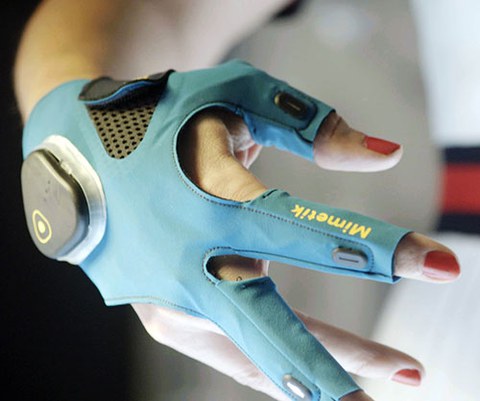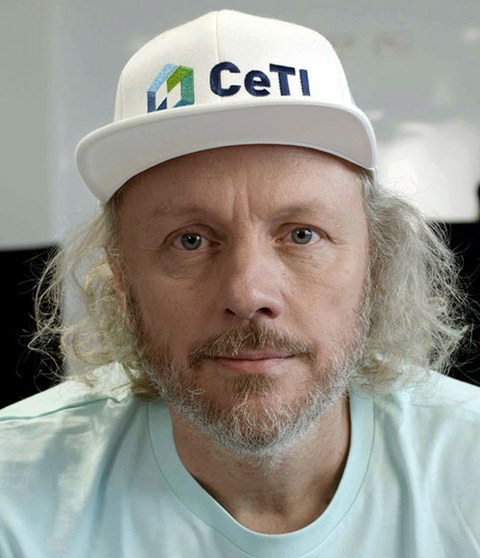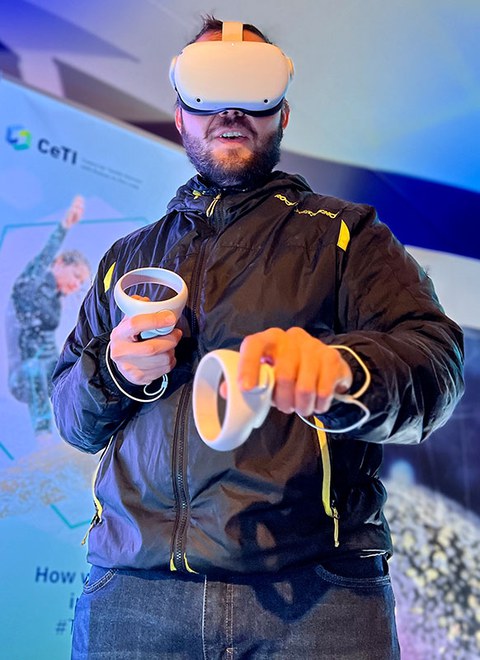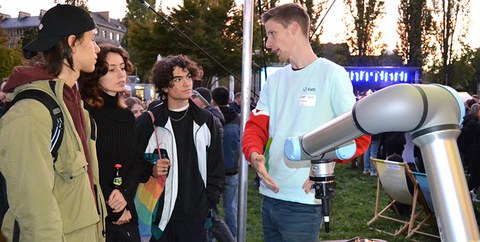Nov 03, 2022
When humans and machines interact
Dagmar Möbius
Learning to play piano using sensor gloves, solving problems with a virtual reality headset or getting a robot to knead bread dough – these are all examples that illustrate what is or will be possible in the future.

Smart wearables are already available for use today. This sensor glove can recognize gestures.
The Centre for Tactile Internet with Human-in-the-Loop (CeTI), a German Research Foundation (DFG) Cluster of Excellence, wants to raise collaboration between humans and machines to new heights. People should be able interact in real time with networked, automated systems in the real or virtual world. Broadening people’s access to the same skills and specialist knowledge – irrespective of their gender, age, cultural background or physical limitations – increases the potential for equal opportunities.
Various disciplines pose new research questions
The Centre for Tactile Internet with Human-in-the-Loop’s interdisciplinary areas of research encompass key areas such as human control in human-machine collaboration, in software and hardware design, in sensor and actuator technologies and in communication networks. “All researchers claim that they are creating something new,” says CeTI speaker Professor Frank Fitzek. “But a Cluster of Excellence stands out thanks to its ability to bring various disciplines together and to find new research questions.”

CeTI Spokesperson Prof. Frank Fitzek
There are around 120 researchers working together at CeTI, with backgrounds ranging from electrical engineering and computer science to mechanical science, psychology, medicine and neuroscience. “We meet once a week and cast new light on questions from research. This concerns novel applications for medicine, industry and the Internet of Skills. Because we are all so different, we find new approaches and can formulate more precise questions,” explains Prof. Frank Fitzek, who leads the Deutsche Telekom Chair of Communication Networks at TU Dresden and coordinates the 5G Lab Germany. For example: “Medicine tells us how people want to move and psychology tells us how people react to errors in communication networks.
Tactile internet and industrial kneading
The Fraunhofer Institute for Organic Electronics, Electron Beam and Plasma Technology (FEP), Carl Gustav Carus University Hospital Dresden (UKD), the German Aerospace Center (DLR) – Institute of Software Methods for Product Virtualization are are affiliates of the Cluster of Excellence. Lisa Küssel, responsible for personnel development at CeTI, explains the research fields in everyday language: “Tactile internet operates as fast as our sense of touch.” One topic the Cluster is researching is real-time data processing. For example, an industrial robot can be taught how to carry out its tasks. “You could place it in a bakery and it would knead dough. In the context of demographic change, this would be a useful application.”
CeTI’s key talent pools are:

Virtual reality headsets can be used in medicine.
- Humans (e.g. computational neuroscience, robot-assisted surgery)
- Sensors and actuators (e.g. smart glasses, e-textiles, audio reproduction and cyber-physical systems)
- Communication (e.g. data communication, compression and security useful to fields that could benefit from up to 100-fold reduction in data volume)
- Flexible electronics (e.g. development of adaptive processors to reduce energy use and battery size to the minimum)
- Tactile computing (e.g. working intuitively with robots through demonstration)
We aren’t afraid of digitalization!
Members of the Centre for Tactile Internet with Human-in-the-Loop regularly visit schools to inform children and young people of the innovative potential digitalization offers us. “We’ve already visited over 200 educational facilities. So many people are now calling us that we no longer have to advertise our services,” says Pit Hofmann, civil engineer and Research Associate at CeTI. By presenting Wandelbots, a TU Dresden spin-off, he demonstrates the intuitive control of robots, which we have no need to be afraid of. These age-appropriate theoretical demonstrations give some students an idea of what they could study. An example of the Internet of Skills is learning to play the piano with smart wearables, such as sensor gloves.

“There’s no need to be afraid of robots,” says Pit Hofmann, a Research Associate at CeTI. He demonstrates the intuitive control of robotics to students.
Contact:
TU Dresden
Centre for Tactile Internet with Human-in-the-Loop
CeTI Exzellenz-Cluster
Tel.: +49 351 463-40407
Email
